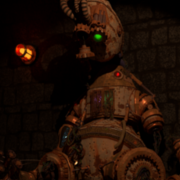Currently I'm playing Breath of Fire: Dragon Quarter, which was recommended to me when I asked for games where one could strategically die or restart to improve one's position within a game. It does fit that description, though it's not at all obvious how to actually use the system for your advantage. It's really quite backwards from the way I was hoping it would work; the only way to permanently improve your character is by beating the game, but what do you actually need to improve your character for if you've already mastered 90% of the game's content??? (Arguably, the fact that you keep your equipped gear and learned skills when you die or restart could be considered a permanent improvement, but the high level gear actually seems to make little difference to the difficulty or speed of the combat, and some of the skills come with a detriment that actually makes it harder to survive to the end of the game every time you use that skill.)
Anyway, here's my question for you all: say you are an assistant designer, working under the lead designer of a single-player RPG with survival elements. The lead designer tells you, "In this game the player is supposed to die. We want the player to be rewarded for dying and starting a new life. I want you to brainstorm ways that dying could be beneficial, and story reasons that going back in time or starting a new life with memories from a previous attempt would make sense within the world and not make the plot look nonsensical in light of the player's future knowledge. For example, say an NPC employer betrays the player on the first time through; the second time, the player's suspension of disbelief and immersion would be damaged if their only path is to get betrayed all over again, with no apparent reason for disregarding their future knowledge."
So, how would you make dying a good thing? Both in gameplay mechanics, and in the context of the story and world.








